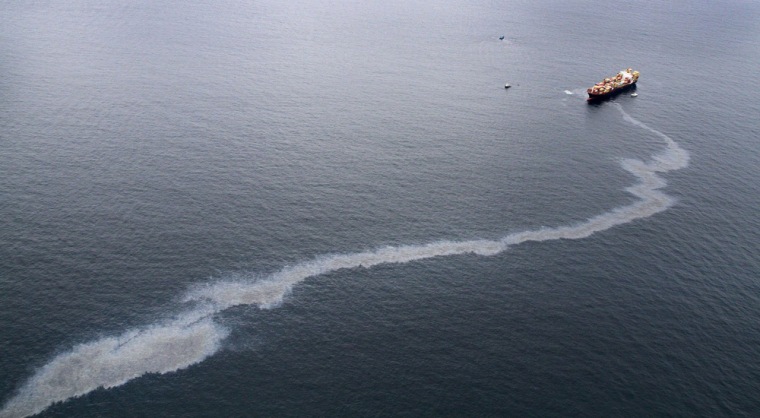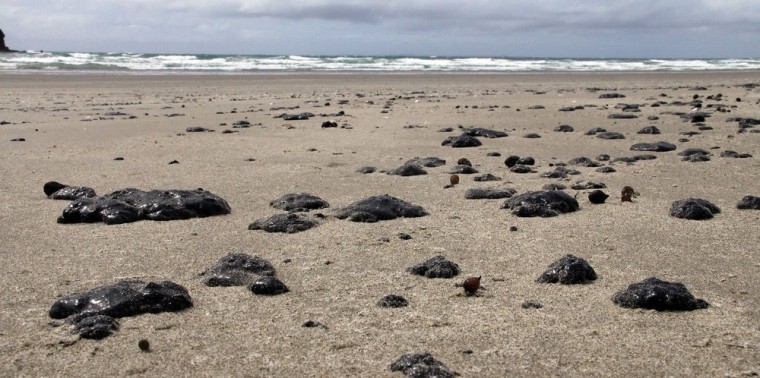Small amounts of oil from a container ship stuck on a reef for days began washing up at a popular New Zealand beach on Monday, while work to extract oil from the vessel was called off because of weather concerns.
The Liberia-flagged Rena struck the Astrolabe Reef about 14 miles from Tauranga Harbour early Wednesday, and has been foundering there since. The 775-foot ship has been leaking fuel, leading to fears it could cause an environmental disaster if it breaks apart.
"Salvage experts and naval architects on board are very closely monitoring the ship and have got sensors in place that will provide advance warning if the vessel's structure is coming under too much stress," Maritime New Zealand said.
After beginning an operation Sunday to extract up to 1,870 tons of oil from the stricken ship — the equivalent of about 10,700 barrels — marine crews halted pumping Monday after managing to remove just 11 tons.
Fist-sized clumps of oil were found at Mount Maunganui beach, a favorite spot for surfers, according to Maritime New Zealand, the agency responsible for shipping in the region. The beach is on New Zealand's North Island, about 100 miles southeast of Auckland.
The agency believes the ship has another 220 tons of diesel on board. So far, an estimated 33 tons of oil or fuel have leaked into the Bay of Plenty.
Because it's a cargo ship rather than an oil tanker, any spill would be small in comparison to disasters like the 1989 Exxon Valdez spill, which dumped an estimated 262,000 barrels of oil in Alaska's Prince William Sound.
However, because the Rena is close to shore, the oil could still foul delicate estuaries in an area known for its pristine environment.
At least eight sea birds have been rescued from an oil slick that extends about three miles from the boat.
Maritime New Zealand said that a barge had begun pumping fuel from the stricken ship, but that work was called off in order to keep crews safe from heavy swells and gale-force winds forecast to hit the area. The operation is expected to last at least two more days once it resumes.
Maritime New Zealand said the weather was about to get worse. "Seas are moderate but they will become rough later, there will be poor visibility and we are expecting showers," it said in a statement.
'Top priority'
Salvage experts and naval architects are on board to monitor the ship, and sensors should indicate if the ship is in danger of breaking apart, the agency said.
"The top priority is to first remove the oil, then lighten the vessel by removing the containers, and finally, move the ship off the reef," it said.

About 200 people are working on the operation, and New Zealand's defense force has about 300 people standing by in case major beach cleanups are needed.
The country's transport minister, Stephen Joyce, warned oil could wash up on beaches for weeks, the New Zealand Herald reported Monday.
"Even in a successful ocean-based cleanup, generally the most people actually pick up at sea is around 10 per cent of the total, the rest of it either disperses naturally or ends up on the beach," he told reporters, the paper said.
"There is no sign yet of it stressing in such a way that would cause a break-up to occur,'' he added. "The weather we're experiencing out there won't be helping, but that's probably an unexpected upside at this point in that the ship seems to be holding together right now.''
Joyce warned that it might be difficult to get the ship off the reef. "Because the ship is rammed so hard on the reef, it was obviously travelling at a good speed when it hit the reef, that is making it pretty challenging," he said, according to the Herald.
On Sunday, New Zealand Prime Minister John Key visited the area and demanded answers.
"This is a ship that's plowed into a well documented reef in calm waters in the middle of the night at 17 knots. So, somebody needs to tell us why that's happened," he told reporters.
In a statement, the owners of the ship, Greece-based Costamare Inc., said they were "cooperating fully with local authorities" and were making every effort to "control and minimize the environmental consequences of this incident."
The company did not offer any explanation for the grounding.
The Rena was built in 1990 and was carrying 1,351 containers of goods when it ran aground, according to the owners.
In addition to the oil, authorities are also concerned about some potentially dangerous goods aboard, including four containers of ferrosilicon. Authorities said they would make it a priority to remove those goods as part of their operation.
